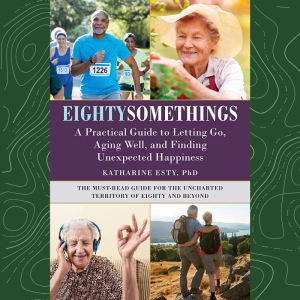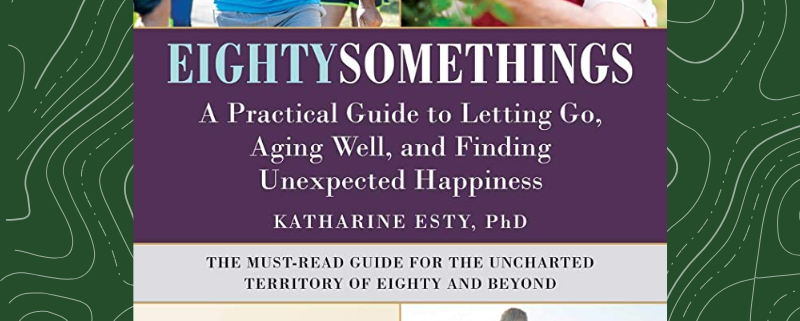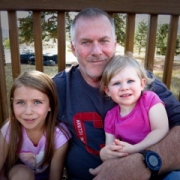Eighty Somethings: A Practical Guide to Letting Go, Aging Well, and Finding Unexpected Happiness by Katherine Esty, PhD | Healthy Aging Series: S8, E1
New Format and New Season
I’ve reorganized the format for my blogs to reflect Seasons!
I’ve written 74 blogs for our website, so I’m introducing the next season as Season 8!
Here is what you can expect in Season 8:
I’ve written 5 blogs from the book, “Triumphs of Experience.” This is a study that was started in 1937 that follow 268 men until 2010. It is an amazing book and gives us lots of insight into aging.
I’ve included 3 book “reflections.” They include books by Mel Brooks, and a book by Katherine Esty, “Eighty Somethings: A Practical Guide to Letting Go, Aging Well, and Finding Unexpected Happiness,” as well as a book by my mother’s favorite author, Gladys Tabor.
There is one blog that asks the question: Can you outrun a bad diet?
And then a blog about life after your parents are gone.
I hope you enjoy,
Mark
Reading time: 3 minutes
What’s the point of reading a book about people in their 80s? At first glance it seems a little depressing. Maybe that’s partly due to the negative images we have of people in their 80s. I was at a Kroger the other day when I man, seemingly in his 80s, was openly and obnoxiously complaining to an employee about the price of food. He told her that it was cheaper at Meyers. I’m not sure what his point was, but I felt sorry for the employee and I thought “Kroger man“ was reinforcing the stereotype of cranky, mean old people. Honestly, I’m sure if I sat down with him and listened to him, I would have learned a lot. Maybe, he was lonely. Maybe he was having trouble affording food.
I shared the story with my wife and if she was the employee, she would have asked him what he would like for her to do about it. K. Maybe. Still. Why take it out on the employee? Still. Why make Eighty Somethings look so unkind. I ask again, why read a book about Eighty Somethings? The important thing to keep in mind is: Kroger man does not represent most 80 somethings.
Katherine Esty, in her book Eighty Somethings: A Practical Guide to Letting Go, Aging Well, and Finding Unexpected Happiness, provides a realistic and sympathetic portrait of people in their 80s.
What’s the point of reading a book about people in their 80s? Here are my takeaways from Estes book:
- Kroger Man does not represent the vast majority of Eighty Somethings. Esty interviewed 128 people in their 80s and was pleasantly surprised that most were happy despite their ailments.
- Folks in their 80s are survivors and have developed lots of skills. Most live on a very limited budget and are doing well. My mother lived on my father’s Social Security and lived well. She seemed to appreciate a simple lifestyle.
- Many Eighty Somethings are taking care of grandchildren and at times, they support for their adult children. Eighty Something households often become multigenerational households. Esty points out that many grandparents lack the imagination to see the important roles they could play in their grandkid’s lives.
- Most Eighty Somethings are experiencing significant loss and maybe we need to cut them a little slack. Estes shares her story of losses. As an Eighty Something she experience the loss of her husband, her strength and stamina, and friends. My mother would share with me her grief over the loss of my father. She missed him. She often talked about losing her old and new friends. She was generally in good health but in her 80s she fell several times due to her loss of stability and strength. Learning to let go is a common challenge for Eighty Somethings. In fact, it’s maybe the most important challenge of healthy aging. Eighty Somethings are, of course, closer to dying than younger generations. Mortality awareness, awareness that death is in evitable, although by itself does not affect attitudes about death, does decreases our fear of dying and increases our acceptance of dying.
- Eighty Somethings are a wealth of wisdom and are a treasure trove of lessons to teach us. “Part of wisdom,” Esty writes, “is self-knowledge.” It isn’t just the ability to live life skillfully. It isn’t just having more experience or more education, or more degrees. Being wise means coming to terms with who you are, your authentic self, and then being comfortable being that person. You give up on pleasing others and on trying to make others happy. You know your place in the universe and you rest in it. It seems to me that the successful Eighty Somethings that I have known and have met have something to say about being human, something to say about living, and something to say about dying. Certainly we could use a little wisdom in these times.
- More than anything, Esty’s book is a game plan for aging. Throughout her book she encourages people who are approaching their 80s to “write their own script.” “Eight Somethings” is written for everyone, but especially for those approaching their 70s and 80s. It’s a manual of a sort. The people that she writes about are survivors. By the time we reach 80 years-old half of our cohort will have passed on. My take away from her book is if you get the privilege of living into your 80s you have no one but yourself to blame if you become that cranky old man at the Kroger. Writing your own script means you get to decide what your 80s will look like. Esty’s book is optimistic about aging. She herself is an Eighty Something who has continued to work as a psychotherapist and find meaning in her life. I found her book to be positive and uplifting and it gave me hope as I approach the end of my seventh decade.

To see more entries in the Healthy Aging series, click here.













